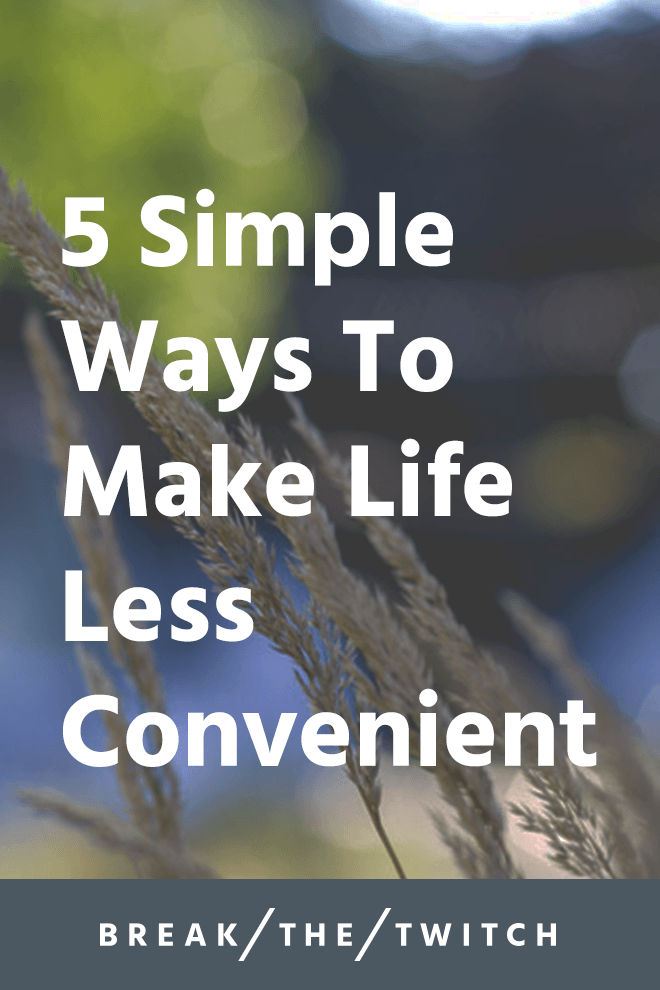
Last week, I pressed a single button on my iPhone and a few minutes later a black Lincoln Town Car pulled up in front of me. A friendly gentleman rolled down the passenger window and said, “Hi! Anthony?” I got into the back of his car and he took me to dinner. Well, at least he took me to where I was going to be having dinner. It was only several years ago when getting to the restaurant would’ve been less convenient.
We’ve reached a point where we can find something we want to buy in a few seconds online and click a single button to buy it. Soon, the Amazon Dash button will further reduce the intentionality of consuming.
With a simple click, a package ends up on our front porch two days later with little to no effort. The money is withdrawn from our bank account with practically zero friction and our lives continue.
There are more conveniences than ever.
It is clear that those who have the privilege of access to these technological advancements are living in the most convenient time in human history. Packages can be delivered around the world overnight. We no longer wait for our information to be delivered, it comes to us instantly from the source. We’re able to browse the internet while 35,000 feet in the air, traveling from New York to Los Angeles (over 2,500 miles apart) in four hours or less. Our food is germinated, grown, nourished, picked, cleaned, and shipped from all over the world and placed in a store a few miles from our home for us to pick up on our way from work.
The majority of these developments are the result of competition driven by capitalism, the never-ending race to create the most convenient solution for consumers. For the creators of these modern conveniences, the desired result is gaining market share and inevitably, profit. The continual push for cheap, convenient, high-volume goods and services has created a world that cares not for intention nor quality, but instead ease of consumption.
Conveniences are only going to increase.
When Uber made calling for a taxi more convenient and less frustrating than ever before, they changed the global transportation industry while becoming a $40 billion company practically overnight. McDonald’s, for example, is a pinnacle of modern food convenience. Near-instant availability without even getting out of our car, while providing us food that is at best questionable in nutritional value. This is a perfect example of a time where we value convenience over the actual content of the product. A new on-demand industry has appeared with GrubHub, BiteSquad, and others that will gladly deliver any food you’d like for a fee, capitalizing on the convenience factor.
If time is our most valuable asset, increasing our available time by outsourcing food delivery, personal transportation and other areas of life could be considered a good investment, right? If we earn a certain amount of money per hour, anything that would give us time back at a lower hourly rate, in theory, is a net gain.
The greater conveniences come at a price.
The problem with convenience is that it is the ultimate enabler of the twitch. Many of these solutions are enabling us to live without being present and without being active in our decision-making. As apps, products, and services emerge to make our lives easier, they simultaneously aim to cut friction from the process of removing money from our bank accounts.
Of course, it’s silly to think that avoiding all convenience is a bad thing. In fact, minimalism itself creates an incredible amount of convenience in our daily lives. By reducing clutter and distractions, we simplify the process of maintaining our homes while living more intentionally. By wearing the same outfit every day we lessen the friction of getting ready every morning, figuring out what to wear, and feeling put together and coordinated. There is great satisfaction that comes from having that process nearly automated.
The key is to focus on increasing friction in the consumption and health-based areas of our lives. Learning to design our lives around this distinction allows us to build increasingly positive odds of success directly into our daily activities.
Here are five areas where we should aim to make life less convenient.
1 / Excessive screen time
Check the smartphone upon waking up in the morning. Spend the entire day working on a computer. The average American then spends five hours watching TV per day. Throw in a few iPhone breaks while going to the bathroom and a few interrupting text messages during dinner, just to be thorough. Most of us spend our lives in front of screens these days. To manage our productivity (and sanity) we have to manage our screen time thoroughly. Take the necessary steps to make falling into this trap less convenient. Cancel your cable TV subscription or sell your TV completely. Reduce your smartphone data plan so that you run out if you abuse it. Enforce a ban on technology for the first hour of every day – don’t let the tone of the day be determined by outside, digital influences. Hide your phone and turn off notifications during dinner and times when you should be focused on loved ones.
2 / Social media addiction
The most effective strategy I’ve found for reducing social media use is to simply delete the app on my phone. If you’re not willing to delete the app completely, move the icon somewhere unfamiliar on your home screen. This twitch is linked to the muscle memory of opening the app on your phone or computer. Often when we’re bored, we’ll open a social media application again mere seconds after closing it. This is mostly due to the repetitive muscle memory of frequently opening the app. In order to break this twitch, you have to change where muscle memory is expecting the app to be. Make opening the app less convenient and give yourself a moment to pause and reflect on why you’re opening it in the first place.
3 / Impulsive spending
Whether it be frequent visits to the mall or a simple click of the purchase button at an online shopping website, impulse spending is bad for us. When we seek to solve problems with retail therapy it may feel good at the moment, but it never solves the real problem. Make impulsive spending more inconvenient by simply not going to places that are psychologically designed to get you to spend money (ie: the mall). Sign out from online shopping websites that you frequent, or perhaps block them completely using these tools. Force yourself to take extra steps (friction) during the process of purchasing something you might not actually need. Begin using cash to make purchases instead of credit cards. Give yourself an allotted amount for the day/week/month and stick to using cash. Freeze your credit cards in a block of ice at home.
4 / Unhealthy eating
The average American eats 130-150 pounds of sugar per year and that statistic is continually increasing. In order to make a change in our diet to live healthier, longer lives we need to make unhealthy foods less convenient. The most important decision in healthy eating often happens at the grocery store. It’s the decisions that we make there that affect what we end up eating later at home. Make unhealthy eating less convenient by not purchasing unhealthy food at the store. Always go grocery shopping after eating a full meal so that impulsive cravings are reduced during that decision process. Avoid going to fast-food restaurants and always have healthy food on hand when hunger sneaks up on you. Throw out the junk food in your house and do your best to get family on board with the change.
5 / Avoiding exercise
A few simple life hacks can completely change the way we live our lives day-to-day. Make avoiding exercise less convenient by implementing environmental changes. If you sit at a computer all day for work, start by switching over to a standing desk. Keep your computer on that desk so that you don’t have the option of sitting while using it. Park your car a few blocks away from your home. When it comes time to go somewhere close, you’ll have to consider walking to the car or just hopping on your bike to complete the task. Most errands under five miles away can easily be done by bike in most cities. Find an accountability buddy that will exercise with you – set a penalty for missing a gym date that either of you has to pay up on.
While it is clear that many modern conveniences are a major benefit to our lives, many of these developments are not. As new solutions to problems come about, we must remember to evaluate whether the added convenience is a benefit to our lives or not. And when we need to, design intentional friction to make it less convenient to fall for the twitch.
Do you agree with my sentiment? Leave a comment below with what modern conveniences you think might not be good for us.

